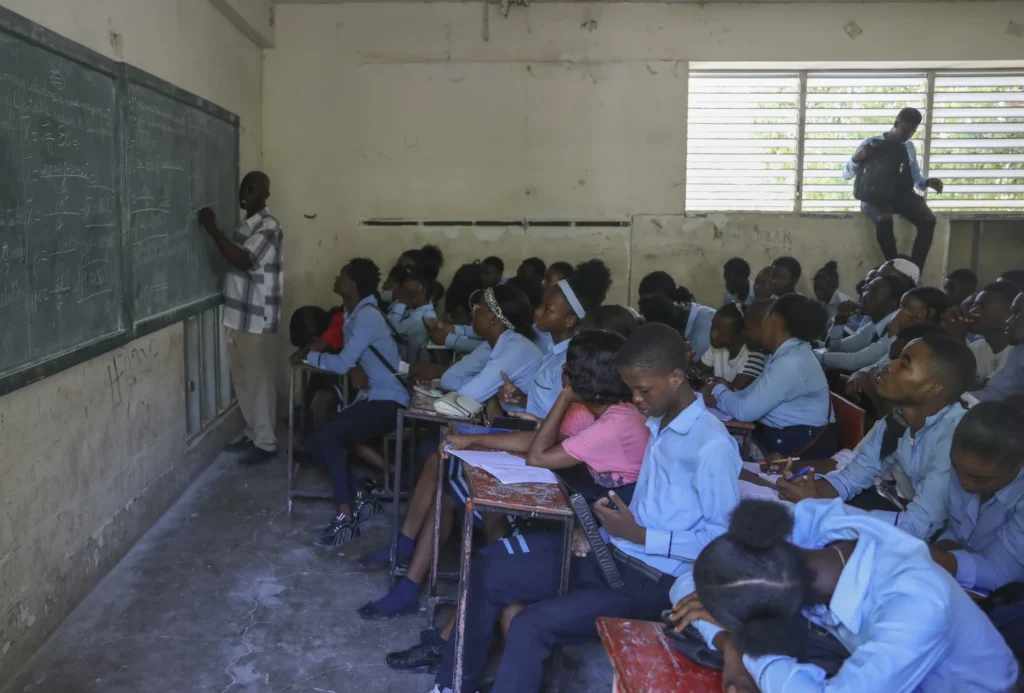PORT-AU-PRINCE (AP) — No chairs. Missing blackboards. A lack of bathrooms.
Schools in Haiti’s capital and beyond are crumbling as gang violence deepens poverty and disrupts basic government services as the state education system faces a $23 million deficit.
“The country needs help,” said Yasmine Sherif, executive director of the U.N. global fund Education Cannot Wait for education in emergencies and crises.
On Friday, she announced a $2.5 million grant that is expected to help nearly 75,000 children via cash transfers, school feeding programs and other initiatives.
A high school student getting her hair done is approached by Yasmine Sherif, executive director of the U.N. global fund Education Cannot Wait for education in emergencies and crises. (AP photo)
Sherif was in Haiti as part of a three-day trip during which she visited schools and met with teachers, principals, state officials and civil society members. She pleaded with the European Union and countries including France and the U.S. to help close the educational deficit as she noted the impact violence has had on education.
At least 919 schools remain closed in Port-au-Prince and in the central region of Artibonite because of the gang violence. The closures have affected more than 150,000 students, according to the U.N.
“Education is part of the solution,” Sherif said. “That would end extreme poverty, extreme violence and create political stability and create a reliable workforce.”
Gang violence also has left some 580,000 people homeless across Haiti, with many crowding into makeshift shelters or taking over schools, causing them to shut down.
Schools that remain operational are increasingly forced to take students from other institutions that have shuttered.
The Jean Marie Vincent School in central Port-au-Prince, for example, has accepted students from a dozen other schools.
“We’re confronting enormous problems,” said its principal, Charles Luckerno. “We’re not the only ones.”
He said that when classes end for the day, people left homeless by gang violence stream into the school and sleep in the yard.
“That also creates very bad hygienic problems,” said Luckerno, who nevertheless allows them to stay. “We are human. We cannot throw them out.”
Williamson Bissainthe, a 22-year-old high school student who is preparing to take his final exam to graduate, lamented the state of some schools.
“A lot of schools are missing benches or chairs. Teachers do not show up on time. The hardest part of this is that there are no bathrooms,” he said.
“I hope that the generation that comes after me doesn’t have to go through the same suffering,” he said.
Private schools are out of reach for many in Haiti, a country of more than 11 million people, with more than 60% earning less than $2 a day.
Among those who have been forced to flee their homes is 20-year-old Megane Dumorcy, who also is preparing to graduate.
She would like to become an agronomist, but education has been a challenge.
“The insecurity has had a huge impact on my life,” she said, noting that some students have been forced to leave their backpacks behind as they flee gangs. “The state should find a solution for that. We shouldn’t be living in a country where our movement is limited.”
She said her school is only half-built and lacks a library, a computer room, a blackboard and chairs. She does research on her phone when needed.
Another blow to Haitian schools was a program that the administration of U.S. President Joe Biden launched in late 2022 that allows Haitians and people from a handful of other countries to enter the U.S. on humanitarian grounds.
“A lot of teachers left,” said Frantz Erine, deputy principal at the Jean Marie Vincent School.
By EVENS SANON/Associated Press

